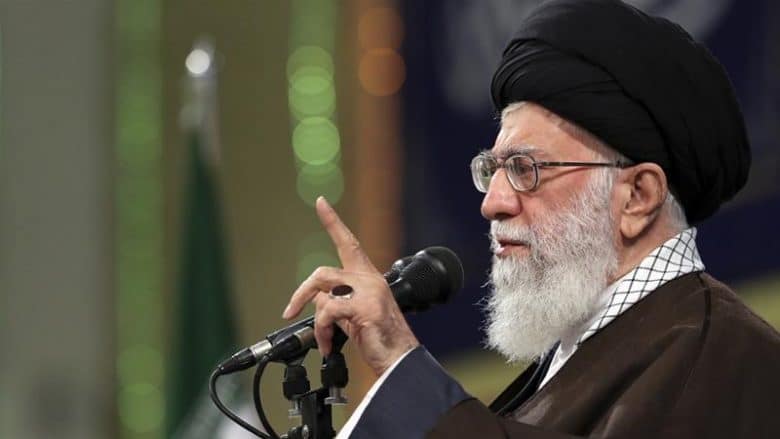In a marked change of line, the Supreme Leader has blamed internal problems rather than “enemies” for Iran’s economic difficulties.
Ayatollah Khamenei told an audience in Tehran:
Today's livelihood problems do not emerge from outside; they are internal. If actions are taken more efficiently, more prudently, more swiftly and more firmly, #sanctions cannot have much effect and they can be resisted. pic.twitter.com/Yyl9mz2oT9
— Khamenei.ir (@khamenei_ir) August 13, 2018
Khamenei focused on the 60% drop since January in the value of the Iranian rial v. the US dollar. He blamed the devaluation not only on “abusers” but also on “overspending and neglect of the country’s currency“.
Over the weekend, the Supreme Leader confirmed steps by the judiciary for extraordinary prosecution of “economic corruptors”, including special Revolutionary Courts and convictions and sentences which cannot be appealed.
See Supreme Leader: “Punish Economic Corruptors Urgently”
Monday’s remarks appear to go beyond this by aiming at the Rouhani Government.
President Rouhani has been under pressure from hardliners, including the Supreme Leader’s office. However, amid nationwide protests, he appeared to stem this last month by taking a harder rhetorical line against the US.
Khamenei said today, If actions are better, more timely, and stronger, the sanctions do not have much effect.”
Citing bribery and corruption, he said, “All people feel livelihood problems today,” including burdens over adequate food and housing. He called for effective oversight, with “the Parliament, the judiciary, and all believers…[to] have a sense of duty and play a role”.
#Iran's Supreme Leader Khamenei makes a very important admission: "Economic experts and many officials believe the cause of this issue is not foreign, it's internal. Not that sanctions don't have an impact, but the main factor is how we handle them." https://t.co/RsqEZMjzYe
— Esfandyar Batmanghelidj (@yarbatman) August 13, 2018
Summarizing the Supreme Leader’s reference to the US, his office tweeted, “Let me say a few words to the people: THERE WILL BE NO WAR, NOR WILL WE NEGOTIATE WITH THE U.S.”
More significantly was Khamenei’s effective renunciation of the 2015 nuclear agreement, saying he made a mistake by allowing Rouhani to enter negotiations: “Red lines were crossed.”
Government Hails Caspian Sea Deal, But Faces Criticism
Iran’s Rouhani Government is facing discontent over its Caspian Sea deal with Russia, Kazakhstan, Turkmenistan and Azerbaijan.
The agreement on the status of the Caspian, the largest enclosed body of water in the world, was signed during a summit in Aktau, Kazakhstan on Sunday. Rouhani hailed a “principle of consensus” on a matter of great “importance”. He added that no foreign military traffic will be permitted: “The point is of great importance to the national security of the littoral countries.”
Foreign Minister Mohamma Javad Zarif wrote on Twitter:
Day of solidarity of Caspian Littoral States: Codifying cooperation on environment, shipping, fiheries, sustainable development & security w/o foreign military presence. Agreeing to continue friendly dialog on unresolved issues of delimitation & shares of sea & its resources.
— Javad Zarif (@JZarif) August 12, 2018
But critics pointed to Iran with a share of the Caspian as small as 11%, as some held up a 1921 agreement between Tehran and the Soviet Union dividing the sea 50-50.
Others noted that Iran was limited in its room for negotiation because Russia, Azerbaijan, and Turkmenistan, had already divided 68% of the sea among themselves in a 2003 tripartite accord.
Sunday’s agreement says the Islamic Republic may hold up to 20% of the Caspian under the terms. Rouhani maintained that further talks will resolve the division of the waters.
Rouhani said the Iranian Parliament must approve the deal, but was not clear what happens in the event of a rejection by the Majlis.
Iran Cancels Visit by Iraqi Prime Minister Amid US Sanctions Row
Angered at Baghdad’s acceptance of US sanctions on Tehran, Iranian officials have cancelled a visit by Iraqi Prime Minister Haider al-Abadi.
Officially, al-Abadi’s office said the trip was cancelled “because of his busy schedule”, although his trip to Turkey is proceeding. Iran’s Foreign ministry denied any visit had been planned.
But an Iraqi official confirmed that the Iranians called off the meeting after al-Abadi said that Iraq would reluctantly have to accede to expanding US sanctions, which threaten any foreign firm with American ties which continues trade and investment with the Islamic Republic.
The Prime Minister noted that because the US dollar is the foundation of global trade, Iraq could not risk harm to its relations with Washington. While the sanctions were an “essential and strategic mistake”, “Frankly speaking, we will not react to them. Yes we will comply with them basically because it is a greater state than us.”
Abadi is trying to hold his post despite his list finishing third in the parliamentary election on May 12. His term as premier was extended at the end of June by Parliament.
State TV Instructs Iranians on How to Resist “Enemy Plans”
Iran’s State broadcaster IRIB broadcast a program on Sunday night instructing Iranians how to resist the “enemy plans” of the US and allies to destabilize Iran.
Framing the crisis as a follow-up to supposed Western creation of the Syrian civil war, the program said a “Syria-sazi” project would infiltrate and radicalize the ongoing protests in Iran over wages, working conditions, economic problems, and currency collapse. Provocateurs would try to incite violence to bring a crackdown by security services, leading to killings that would provide the US with a pretext for more economic pressure.
The broadcast included interviews with students, academics, and people on the street, asking them how they would respond to monarchists — including Reza Pahlavi, the son of the late Shah — and the Mojahedin-e Khalq Organization, which has sought the overthrow of the Iranian regime since the 1979 Islamic Revolution.

